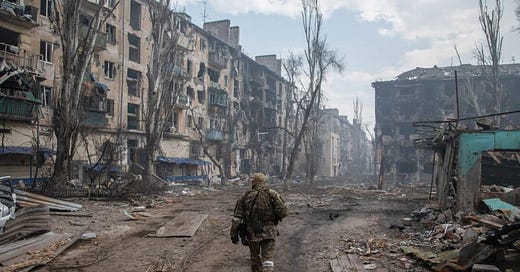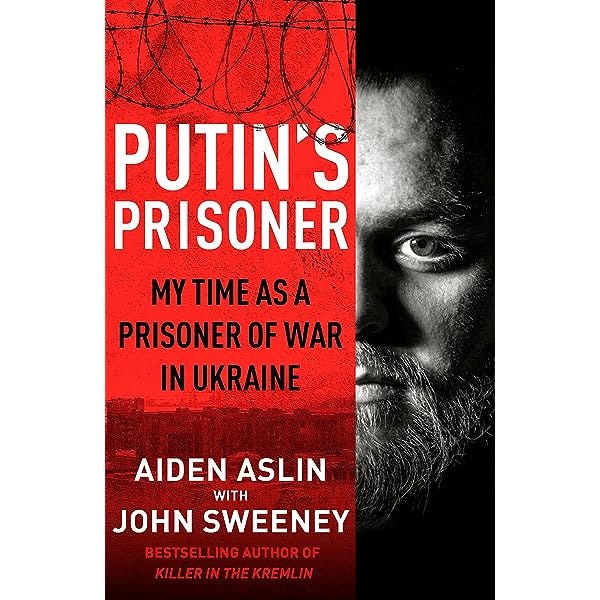Aug 7: Interview with Aiden Aslin, Battleground Ukraine
Links to the interviews with Aiden Aslin, a British citizen who fought for Ukraine and was taken prisoner--my comments--Aslin's article published in Military War Institute
Battleground Ukraine: Interview with Aiden Aslin
The two episodes of Battleground Ukraine podcast in this post feature interviews with Aiden Aslin, a British soldier who fought in Ukraine. He was stationed in Mariupol in 2022. I was following Aslin’s account (Cossackgundi) and his experiences at that time. He is very well-respected in the Ukrainian community.
I had read about the experiences of others in Russian captivity, but nothing prepared me for the interviews. Patrick Bishop and Saul David, the podcast hosts, let Aslin speak uninterrupted. Aslin tells his story in full detail from his past experience, to the fighting in Mariupol, his captivity and release.
72. Putin's Prisoner: Inside the Siege of Mariupol
In this episode Saul and Patrick speak to Briton Aiden Aslin, who travelled to Ukraine in 2018 and enlisted with the Ukrainian 36th Naval Infantry Brigade.
He describes his time on the frontlines in the Donbas before the full scale invasion was launched in February 2022, when he was deployed to Mariupol.
Aiden was then surrounded by Russian forces in the Siege of Mariupol where he describes what it was like in the vast steel works complex in the final days of the siege before his surrender to Russian troops.
74. Putin's Prisoner: Life in Captivity
In this part of his gripping story he describes the brutality of his time in captivity, where he was violently beaten and was forced to conduct recorded video interviews for propaganda purposes, before finally, he was released as part of a prisoner swap deal.
Monique: I remember the absolutely horrific interview with an Italian ‘journalist’. The same journalist some time later also ‘produced’ a documentary on the battle for Mariupol—a Russian propaganda film in essence.
Some Russia-aligned Italian propagandists tried to paint Aslin as a nazi, in keeping with the dictats of the Kremlin. What’s important is that Aslin set the record straight when he was released and could speak freely.
If you prefer to read Aslin’s book, you can find it here or at your favourite bookseller. I haven’t read it yet but intend to get to it this week.
You may want to look out for a post I’m putting together on some other reads that have had a huge impact on me, and further deepened my knowledge of issues surrounding Ukraine, Russia and Russia’s war against Ukraine.
UNSEEN SCARS: THE PLIGHT OF POWS HELD BY RUSSIA—AND THE ONGOING STRUGGLE OF THOSE RELEASED
By Aiden Aslin, Modern War Institute, 03 Aug 2023
Seeing the smiling faces of recently released Ukrainian prisoners of war in photos and videos of their emotional return, you can almost feel the pure joy of the moment. It is the strongest possible contrast with the trauma of imprisonment that the POWs have endured. But their challenges are not over. The reality of adjusting to life after spending months in captivity in some of the worst conditions imaginable leaves a mark on the newly freed that is often unseen by those around them.
There is no precise official figure regarding the number of prisoners captured by either Russia or Ukraine in the conflict, but the number is almost certainly in the thousands. For those lucky enough to be among the several hundred exchanged, life remains a struggle after returning.
From my personal experience, I spent weeks still in a state of shock after my release from more than six months held prisoner in Russian-occupied Donetsk, having gone from being terrorized and tortured to now reacquainting myself with the simplest of human experiences, like brushing my teeth.
I would be lucky if it was only the memories of what I had just endured to contend with. Eager to reconnect with the friends I had made during captivity who were taken out of my prison cell, I sought them out, believing they were exchanged long before me. Prisoner movements were normally followed by announcements on the propaganda radio in our cell that a large prisoner exchange had taken place. Only after I was released would I find out that my friends remained imprisoned, a discovery that weighed heavily on me. This wasn’t just an individual case either; many of my fellow Ukrainians endured a much more severe abuse than I did and were also struggling with both the trauma from the experience and the weight of having been released when others remained in captivity.
Of those who were released, some of my former comrades will return to the front lines. Others will be transferred to rear duty where they can train people who need the experience. Those rendered incapable of continuing service are relieved of their military duties. They instead bear the burden of living with their physical injuries sustained during war and captivity as well as the hidden mental scars.
Among those who choose to return to the front lines, their circumstances often make that decision inevitable. For most of the marines and Azov soldiers captured in Mariupol, their home was there. Many of their families were unable to escape occupied areas, while others had been already killed by Russian bombing that leveled the city. There is no home left for them to retire to.
During my first month in captivity, I met various civilians in our prison who were taken from Mariupol and suffered the same treatment I did. Some of them were retired veterans who had served in the Soviet military back in the 1980s. Others were imprisoned for simply being humanitarian aid workers trying to deliver critical support to civilians trapped in the besieged city. None of these civilians could have known what to expect under Russian occupation. For those who were captured, hoping for reasonable and humane treatment was simply something you could not rely on.
As a foreigner in a different nation’s military, my experience was unique compared to my brothers in arms who are Ukrainian. The Russian authorities paraded me and other imprisoned foreigners around on television and repeatedly described us in their propaganda as mercenaries. The Geneva Convention outlines the legal definition of a mercenary, which clearly did not apply.
We were sworn-in service members, fully integrated into the Ukrainian military. We were sentenced to death in a kangaroo court, which Russian propaganda proudly publicized. This absurdity is akin to labeling the British Army’s Gurkhas as mercenaries. For those few foreigners among the prisoners, this rigged trial and sentencing compounded the trauma of our captivity. But the fate of being a POW in Russian hands is one riddled with uncertainty for all those held captive.
With the war raging on, the number of people captured and held as prisoners will doubtlessly increase. The experiences they endure must be accounted for by countries that support Ukraine. So long as it is clear that the world does not turn a blind eye to the mistreatment and condition of POWs, current and future prisoners in this war will have a fighting chance of making it home still human.
When officials in Moscow and in Russian-occupied territories of Ukraine know that the world is watching what takes place even in its darkest corners, that the accounts of POWs are heard around the globe, only then will captors be forced to respect the human rights that every individual deserves.
And for outside observers who see the conflict through the lens of statistics, arrows drawn on maps, and sporadic battle footage, it becomes easy to perceive the situation of POWs from a distance, thinking of them as numbers. But they are individuals, and each of their stories deserves to be heard.
Those stories, unfortunately, do not just have a happily-ever-after ending upon their release. For them, their fight for survival is still not over. For those still fighting that fight, and for those still held in captivity, the world must let their captors know that it is watching.




